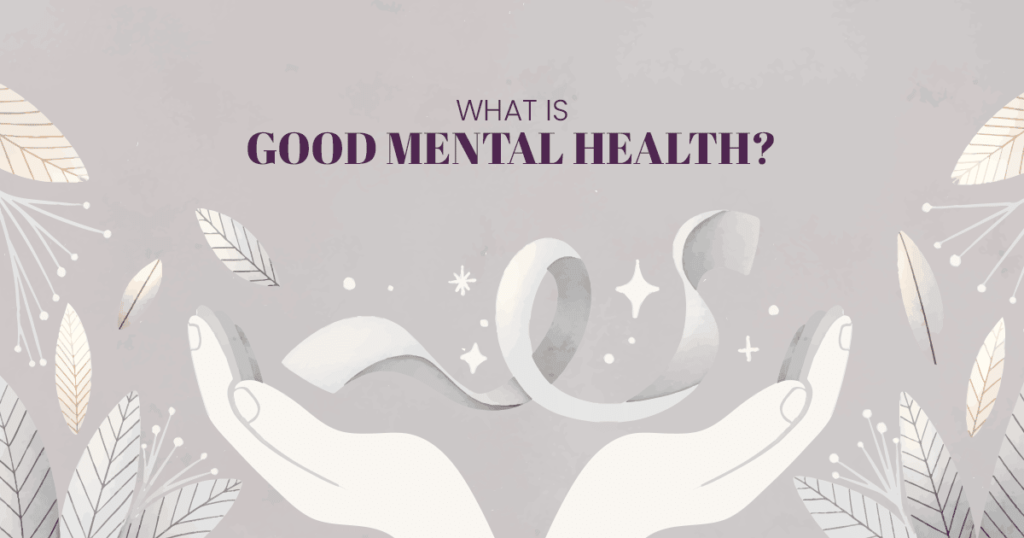We often talk a lot about problems with mental health, but we talk less frequently about an answer to “what is good mental health.”
How do we define good mental and emotional health? What are the signs of someone experiencing good emotional health versus someone who’s not?
It can be much easier to see when you’re in good physical health compared to your emotional health.
For example, the signs of physical illness can be outwardly apparent, whereas your emotional well-being isn’t as obvious.
We need to be able to gauge when we’re doing well and when our mental well-being is meeting certain milestones.
What Is Mental Health?
First, what is mental health?
- Emotional health includes not only our psychological well-being but also our social well-being.
- Our mental health affects how we think, act and feel.
- This part of our lives affects how we handle stress, relate to other people, and our decision-making.
Mental well-being is important at every phase of our lives, from childhood through adulthood.
There is a wide variety of contributing factors that impact mental health.
- For example, biological factors play a role. Biological factors affecting mental health include brain chemistry and genetics.
- Life experiences, like a history of abuse or trauma, can affect you mentally.
- A family history of mental disorders or problems can also be part of your own mental health.
When you take care of yourself mentally, you can enjoy your life. Conditions like anxiety, depression, and stress can negatively affect your mental well-being.
What is Good Mental Health?
What is good mental and emotional health?
The World Health Organization (WHO) has its own definition. According to the WHO, it’s a state of well-being. In this state of well-being, individuals recognize their own abilities and can cope with the stress in daily life. A person can contribute to their own community and work productively.
The WHO points out mental health is more than the absence of mental disorders. Peak mental health is about treating and getting active conditions under control and caring for your ongoing happiness and wellness.
Mental Health Center of San Diego
Signs of Good Mental Health
The following are some of the indicators that you’re mentally doing well.
You Understand That Ups and Downs Are Natural
When you have good health mentally, that doesn’t mean you never experience any downs in your thinking or feelings. You’ll have a negative emotion from time to time. Nothing is perfect. That wouldn’t be something anyone should expect. Instead, you realize that you’re resilient.
When you experience unpleasant emotions, you recognize they’re waves and that you’ll once again return to feeling better and having primarily positive emotions.
To truly have good health mentally, you’re aware that negative emotions are unavoidable in life sometimes. When necessary, you overcome them so they don’t become a more ingrained pattern.
You Feel Well Overall
Overall, you feel satisfied and good with a typically positive mindset and a good sense of emotional regulation. You have feelings of happiness, love, and joy in different aspects of life.
When you do experience negative emotions or high-stress levels, you actively work to make sure they don’t develop into a pattern. You know when you should be accountable for your actions, but don’t blame yourself for everything.
Someone with good emotional wellbeing will also see varying perspectives in different everyday situations.
You Have a Sense of Belonging
When your mental health is where it needs to be, you’re contributing to society and the world around you. You feel like you belong to a community, whatever that may look like for you. You have a sense of purpose in your daily life as part of that connection.
Mental Health Center of San Diego
Good Coping Skills
Everyone is going to face challenges or difficult situations in their life. You can deal with ups and downs accordingly when you’re doing well mentally. You can deal with stress while you’re still also productive at work or in other areas of your life.
You Set Healthy Boundaries
There are situations where everyone should say no, and it’s the appropriate response. You also know how to set boundaries and define where your responsibilities end and someone else’s begins. Mentally resilient, strong, and healthy people are okay with saying no to things that don’t serve them.
You don’t feel guilty when you say no.
Your Relationships Are Healthy
Being mentally healthy shows in how you treat other people in your everyday life and your social skills. You treat people fairly and with respect. You don’t spend time worrying about negative or toxic people, nor do you let them infringe on the boundaries you set for yourself.
You’re Able to Focus on Yourself in Healthy Ways
Being mentally well doesn’t mean you’re selfish or self-centered. It does, however, mean that you’re able to focus on yourself in healthy ways. You take care of yourself when you need to. You’re active and purposeful in self-care and taking time out to recharge.
People with Good Mental Health Don’t Go Overboard Trying to Please Others.
If you notice that you’re a people-pleaser, then you probably also have a hard time with boundaries. This can make it difficult for you to interact with others healthily. Someone who has good, resilient mental health won’t go overboard trying to please others.
That doesn’t mean you aren’t helpful and respectful, but you have an understanding that not everyone is going to like you. You’re also okay with the fact that you can’t make everyone happy all the time.
Mental Health Center of San Diego
Taking Care of Your Mental Health
The topic is complex. Just because you don’t have a mental illness, that doesn’t mean you have good mental health or that you’re thriving the way you could be. At the same time, if you have a mental disorder or feel your emotional health is poor overall, you’re not powerless. There are a lot of things you can do to change it.
No matter where you are right now, your psychological health and well-being aren’t fixed or finite. They’re absolutely changeable, and you can get to a better place.
A lot of the work that you’ll do to get to that better place will involve working on resiliency and learning coping skills. No one’s life is perfect. No one is going to experience a life that’s without problems. Strong mental health is about realistically facing those problems and everyday stresses.
You can learn to do this by working with providers at mental health treatment centers.
If you’d like to learn more about improving your emotional and psychological health and developing resilience and coping mechanisms, the Mental Health Center of San Diego is here to talk to or answer questions; just call (858) 258-9883. We can also help if you have questions or concerns about a specific mental health issue or mental health conditions.









